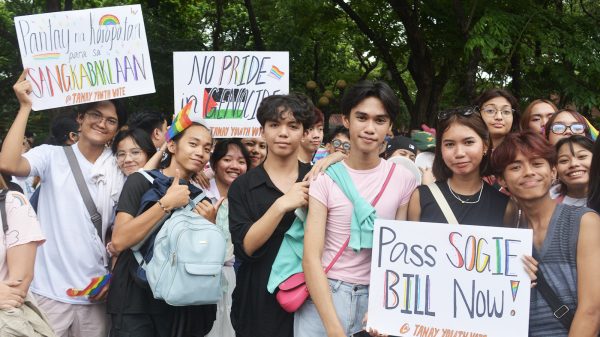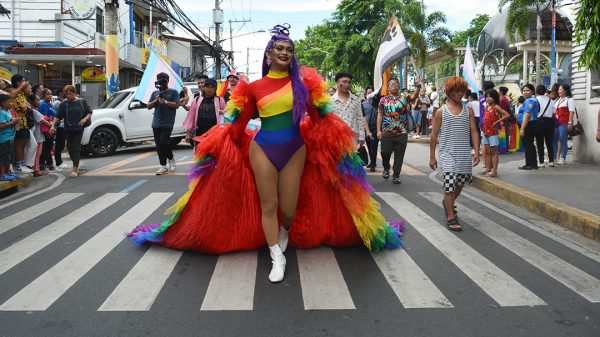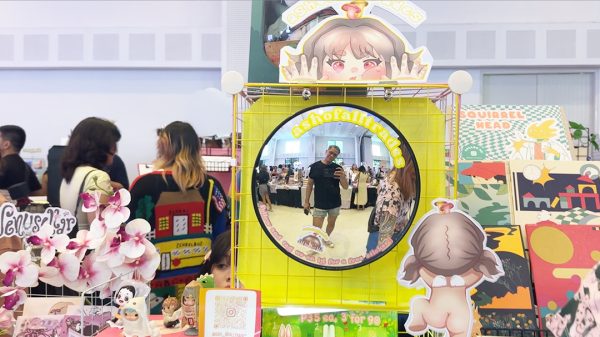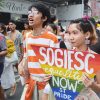In 2000, Bruce Amoroto “came out of the closet, having met my first boyfriend,” he recalls. That coming out coincided with him working as a staff for the Freedom from Debt Coalition (FDC) Philippines, an affiliation that enabled him to meet “other social-economic justice, human rights, and then GLBTQIA rights activists. Through my friend Jonas Bagas (fellow UP CSSPian), I became involved with Task Force Pride (TFP) Philippines and Lesbian and Gay Legislative Advocacy Network (LAGABLAB) Philippines,” and from there, Amoroto has never looked back as far as his involvement in the Filipino GLBTQIA community is concerned.
That he has been around is an understatement.
In 2002, he was a delegate at the Amnesty International Global Human Rights Conference; and, in the same year, he was the lone Philippine representative for table tennis at the Sydney 2002 Gay Games (this eventually led him to help establish the Philippine Forum on Sports, Culture, Sexuality and Human Rights Inc. or TEAM PILIPINAS). In 2005, he was part of the organizing committee of the first Manila Lesbian, Gay, Bisexual and Transgender Freedom March. And in 2006, “I led the organizing of Liga Pilipinas for the Chicago 2006 Gay Games, (aside from being) a delegate-presentor at the 1st International LGBT Human Rights Conference for the 1st World Outgames in Montreal, Canada.”
“I am still involved in the ‘debt and development’ issue, being a secretariat member of the Citizens’ Debt Audit Commission; I am also still a member of FDC; and, on top of these, I am also the coordinator-president of TEAM PILIPINAS, (aside from serving as) vice president of the Gay and Lesbian Asia Pacific Sport Association (GLISA Asia Pacific), and I also sit in the Gay and Lesbian International Sport Association (GLISA)-International Board of Directors as Asia-Pacific director,” Amoroto says.
COMING OUT
Interestingly, for Amoroto, “my biggest achievement, I would like to think, is when I finally embraced who I truly am and proudly told people that ‘bakla ako’ (I’m gay). I consider my biggest achievement because it was truly, truly liberating for me,” he says, recalling how, “when I was about seven years old, I felt I was ‘different’ from the rest of the boys – while I wanted boy toys, I was very good at Chinese garter, and I always wanted to play with the girls instead of the rowdy and rough boys. But I didn’t experience any attraction towards boys – err, men – until I was in second year high school.”
Amoroto adds: “From grade school to the middle of high school, I experienced attraction towards the opposite sex, including what they call puppy love. I had my first sexual experience, with the same sex, in high school. I have never had any sexual experience with the opposite sex, but in high school all the way up to when I was already in UP Los Banos and then in UP Diliman, I kept thinking that my attraction towards the same sex might just be a phase, and that once I get a girl friend, everything will be alright. I graduated in UP Diliman after three years and a semester, and one summer, I was chatting online, and that’s how I met my now ex-boyfriend, my boyfriend of five years. Gregg was one, if not the main reason, I came out of the closet, and when I did, OH MY, it was the most liberating, the happiest time of my life.”
Amoroto believes in the “fluidity of sexuality. “Who knows, I might still be attracted to the opposite sex, or even marry one, but at this point in my life, all I can say is that I’m happy and content with what I have become, who I am and with whom I want to sleep (with),” he says, laughing loudly.
FACING CHALLENGES
Amoroto admits that “there are certainly many challenges both within and outside Philippine society, and within and outside the GLBTQIA community. The biggest challenge, of course, is living not just with discrimination on the basis of sex, gender, sexual orientation, and gender identity, but, more importantly, discrimination that is systemic and structural, that which has perpetrated poverty here in our country,” he says. “Being a socio-economic and environmental justice and equal human rights activist, I think it is important to take a more holistic, long-term, and more progressive view of issues, instead of taking the myopic and regressive stance.”
With this, Amoroto considers “my biggest challenge as part of the GLBTQIA movement is convincing my colleagues to take on bigger and sector-cutting issues, issues outside of sexuality, sexual orientation, and gender identity; issues like poverty, debt, or global warming. It’s been a struggle for me, but I think in time there will be more and more GLBTQIA activists taking on or getting involved in ‘mainstream’ issues.”
TEAM PILIPINAS is, in fact, leading a project (to be launched in May 2009), the Diversity and Equality Week, which “hopes to enable GLBTQIAs and GLBTQIA organizations to reach out to other social and environmental justice movements and organizations in the spirit of friendly competition, dialogue for mutual understanding, and solidarity.”
PEOPLE EMPOWERMENT
For Amoroto, the biggest problem in the Philippines “is still lack of free, adequate, and empowering education. For the GLBTQIA sector, for example, we are discriminated, there is hatred, homophobia, and stigma, because many Filipinos still lack information (on) what exactly is being bakla, tomboy, silahis, bayot, gay, lesbian, bisexual, transgender, intersex, et cetera. In the Philippines, we only have the concept of kasarian, which means gender, and we have yet to culturally own the concepts of sexuality, sexual orientation, and gender identity – concepts which are key in understanding issues of GLBTQIAs and other sexual orientations and gender identities.”
He, therefore, believes that “there is a need here in the Philippines to concretize and consolidate our indigenous appreciation of the various sexual orientations and gender identities, and use this body of knowledge to educate and empower Filipino GLBTQIAs.”
Amoroto acknowledges, though, that “Change does not happen overnight. Change is certainly the most permanent thing in life, but it would be very frustrating or disappointing if we expect that changes happen soon, not just in the world and in Philippine society, but also within the GLBTQIA community,” he says.
For the activist, the GLBTQIA community isn’t necessarily just a victim of social injustices. “I guess what I am critical about our community is that despite our call for equality and non-discrimination, we can also be the most rabid discriminators and oppressors, and one can easily observe these in banters and jokes of GLBTQIAs towards each other. If you listen to the jokes, they are most often (loaded) with references to socio-economic status, physical feature, skin color, race, ethnicity, and the likes. Call me boring, but jokes to me are most often half meant, and I believe if one can joke about any of the areas I just mentioned, most likely, there is some discriminatory or oppressive streak to that person. Some people call it ‘preference’ or ‘positive prejudice,’ but, overall, they are still forms of prejudice and discrimination. I think we still need to have a more critical understanding of discrimination. I think the community still needs to understand and realize that discrimination in whatever form or kind, and on whatever aspect or issue is still discrimination, and if the community is calling for equality and non-discrimination, then the community should practice what it preaches or what it asks for.”
Amoroto remains hopeful, however, seeing one thing that inspires him in the GLBTQIA community: Love. “Call me a romantic fool, but love is certainly one of my inspirations. I am aware that not all people want to be in a relationship, to be married or to have kids, but I am really happy, overjoyed for those who want to be or are in love or in a relationship,” he says.
For now, though, he looks at achieving more.
“(What else do I want to achieve) aside from world peace?” he asks, followed by a wide smile, before tuning serious. “Seriously, aside from contributing to the broadening and strengthening here in the Philippines of the discourse on equal human rights of GLBTQIAs, to cover not just civil and political rights, but, more importantly, economic, social, and cultural rights, I hope to be able to contribute more to the freedom of GLBTQIAs in other parts of Asia-Pacific, especially in countries where gays and lesbians are extremely persecuted. I would also like to contribute to the strengthening and realizing of a human rights system and structure in Asia (as) we badly need such a structure and system in our continent, not just for GLBTQIAs, but for all of citizens of the region.”
Then, again with a smile, Amoroto turns romantic, as he says: “Lastly, I would like to be legally married and have kids.”



























































